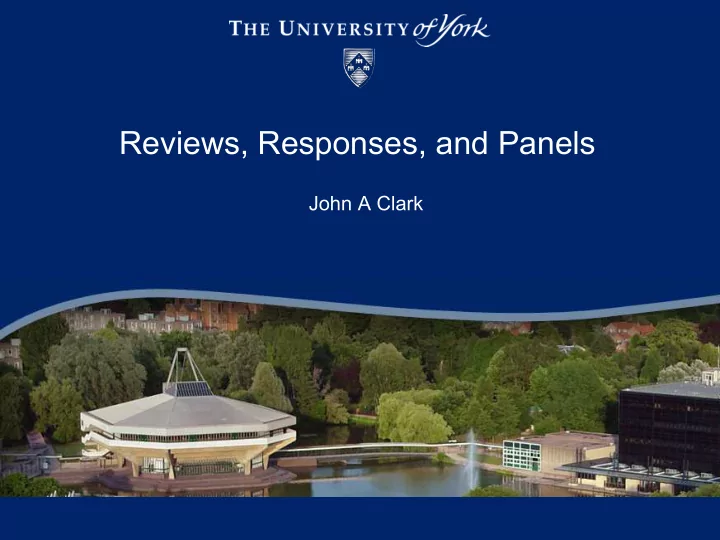

Reviews, Responses, and Panels John A Clark
So who decides who gets a grant?
Reviewers and Panels In most cases your proposal goes out to peer review from experts in your proposal’s field. They will examine your proposal and write reports that are then considered by a convened panel. Level of expertise varies: some may be distinctly specialist in the area, others may work in the general area and deemed competent to make judgments on related areas. In some cases you are asked to nominate reviewers, typically with some commitment to take up at least one. (This is what the EPSRC do.) Reviewers do tend to be busy people – you must take this into account when you write proposals. You really need to craft them.
Referees Some referees/reviewers give genuine insight. The reports of others can simply be infuriating. So who are the referees? People like me! Referee People like you! “ Genius ” “ Idiot ” Clearly likes Doesn’t like your People like those in your your proposal. proposal research group! Aim to write a solid proposal that avoids predictable criticism and general pitfalls.
Why do reviewers & panellists do it? n Curiosity about latest research. n Duty/Expectation to serve the community. n The more you review, the more you get a grasp of what to avoid when you write your own proposals. n How to avoid all the pitfalls mentioned earlier. n You see the variety of criticisms that can legitimately or otherwise be made. n Stylistic aberrations, why calm, positive, factual structured cases go down better.
Why do reviewers & panellists do it? n Similarly, when you are a member of an EPSRC panel, you get to see how they operate. n Why PI responses matter a good deal. n As a chair of a panel you get to see who was invited to review, who accepted, who was too busy, who declared a conflict of interest. n This can be quite an eye opener. n You see the modus operandi of the EPSRC and the degree of helpfulness of the community.
Why do reviewers & panellists do it? n So, if you are asked to review/be a panelist etc: n Do it if it is within your competence and you can meet the indicated deadline (or a later negotiated deadline). n If you have to decline, do it quickly. Declining with good reason is fine, declining late causes real problems and delays ripple through the system and are felt by the grant proposers (people like you) n Engagement generally results in a less cynical view of the process. n Reviewers usually aim to turn in a competent and constructive review. n Some do a perfunctory job, but these are recognised.
PI Responses and the Panel Referees produce reports. You are generally informed of the referees comments. With the EPSRC you then typically have Ref A states…But as we say in our proposal… 5 working days to respond. Ref B requests clarification on how researchers will RESPONSES MATTER. gain access to training. The University… Panel meets to discuss all proposals. They have the referees reports and also the various responses from the proposers.
PI Responses and the Panel At EPSRC panels there are three speakers who summarise the views of the referees and comment on how well you have responded to criticisms. They produce a Ref A states…But as we ranked list. say in our proposal… Ref B requests clarification on how researchers will Panel EPSRC gain access to training. Proposal 1: 9.9 The University… Proposal 1: 9.85 Funded Proposal 3: 9.84 Fundable Proposal 12: 9.35 Proposal 13: 9.34 Second chance 3,2,1, or 0? Proposal 24: 8.8 Unfunded Proposal 25: 8.75 Unfundable Proposal 53: 7.9
PI Responses n Often referred to as “rebuttals” but the actual (neutral) term is PI Response” n And if the reviews are 5 x 6 out of 6 what on earth would you wish to re-butt? n These are (typically) two page responses that technically allow you to correct factual inaccuracies and requests for clarification. n However, what constitutes an inaccuracy/request for clarification is a movable feast and most use them to respond to any explicit or implied criticisms. n “It is unclear form the proposal how the investigators intend to do X … .” n Is this a “factual error” or an implied request for further info on how X will be addressed? n Not in your interests to assume the former.
PI Responses n THESE CAN MATTER A LOT. n Worthwhile crafting responses. n Where possible, refer to your actual submission: n “As we say in our proposal section 3.2.1 X will be handled by adopting the variable reordering approach of Y [1].” n “The proposal provides insufficient detail with regards to X” n This may be true but is clearly (my view, and undoubtedly yours, if you get this criticism) a request for further detail (whether it is in the proposal or not).
PI Responses n “I just don’t think this approach will work” n Probably technically true, but you don’t have access to the referee’s brain state! n “Referee X voices an opinion that he does not think our approach will work, but provides no rationale for this view. A comprehensive argument for the promise of our approach is made in Section 4.5.6 of our proposal, a view further supported by work in a different application domain appearing since our submission [1]”
Recommend
More recommend